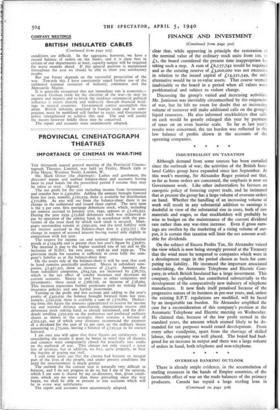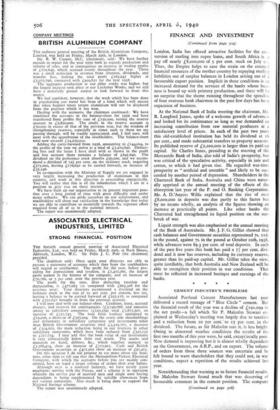OVERSEAS BANKING OUTLOOK
There is already ample evidence, in the accumulation of sterling resources in the hands of Empire countries, of the favourable effect of war on the trade balances of the primary producers. Canada has repaid a large sterling loan in (Continued on page 506) FINANCE AND INVESTMENT
(Continued from page 504)
London, India has offered attractive facilities for the con- version of sterling into rupee loans, and South Africa is 1 pay off nearly £8,000,000 of 5 per cent. stock on July 1st. Thus, the Empire helps to ease the strain on the extern.,1 financial resources of the mother country by repaying sterling liabilities out of surplus balances in London arising out of a favourable export position. Implicit in these conditions is an increased demand for the services of the banks whose busi- ness is bound up with primary production, and there will he no surprise that the theme running throughout the speeches of four overseas bank chairmen in the past few days has been expansion of business.
At the National Bank of India meeting the chairman, Mr. R. Langford James, spoke of a welcome growth of advances and looked for its continuance so long as war demanded an increasing contribution from raw material producers at a satisfactory level of prices. In each of the past two years this old-established institution has held its dividend at 16 per cent., and made substantial transfers to property account. Its published reserve of £2,200,000 is larger than its paid-up capital. Sir Charles Innes, presiding at the meeting of the Mercantile Bank of India, also told of India's prosperity, but was critical of the speculative activity, especially in jute and cotton, to which it had given rise. He regarded war-time prosperity as " artificial and unstable " and likely to be suc- ceeded by another period of depression. Shareholders in the Chartered Bank of India, Australia and China were natur- ally apprised at the annual meeting of the effects of the absorption last year of the P. and 0. Banking Corporation. Mr. A. D.'Anyers Willis explained that the rise of over L8,000,000 in deposits was due partly to this factor but by no means wholly, an analysis of the figures showing an increase at practically all points. Like other banks the Chartered had strengthened its liquid position on the out- break of war.
Liquid strength was also emphasised at the annual meeting of the Bank of Australasia. Mr. J. F. G. Gilliat showed that cash balances and Government securities represented 7s. lid. in the pound, against 7s. in the pound at October loth, 1938, while advances were 89.3 per cent. of total deposits. In each of the past five years this bank has paid a 71 per cent. divi- dend and it now has reserves, including its currency reserve, greater than its paid-up capital. Mr. Gilliat takes the view, quite justifiably, that both Australia and New Zealand will be able to strengthen their position in war conditions. That must be reflected in increased business and earnings of the banks.
* * * *















































 Previous page
Previous page